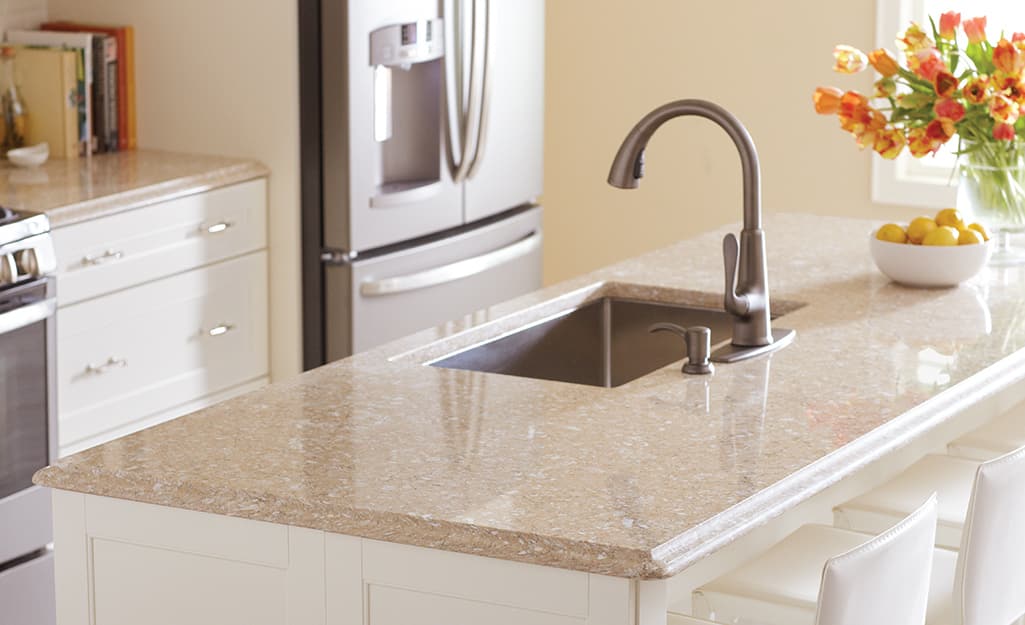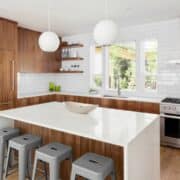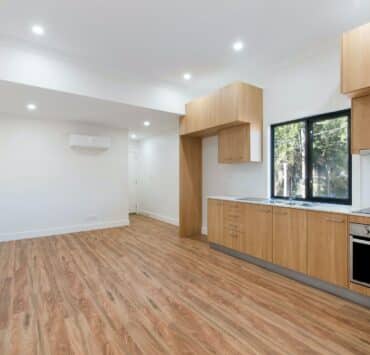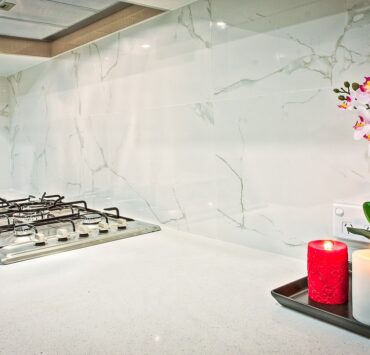Kitchen countertops take the maximum brunt in your kitchen. Cutting, chopping, spills of all kind and stains – you name it and the countertop takes it.
It follows that you need to be extra careful with your choice of a kitchen countertop. Besides the sturdy aspect, you also need to remember that countertops add to your kitchen’s design vocabulary and often serve as the central design piece of the space.
Isn’t that the first element you notice as soon as you enter the kitchen? This implies that the countertop you decide on must be pleasing to the eye; besides being capable enough to carry the entire load.
We are sure you already have a few options in mind that you fell in love with during your Pinterest-fuelled design ambitions. But how about learning a few basic facts about the countertop materials first? This will help you to choose a countertop that will last for ages.
Here are few popular kitchen countertop materials you can consider:
Marble Countertops
Marble is easily one of the most high-end natural stones for kitchen countertops. The material stands out with its luxe appeal and adds a classic look to a kitchen. It helps to create a lovely natural pattern which you don’t get with many other artificial materials.
Be mindful that marble is expensive. This accounts for the material being used in selective parts of the kitchen like an island or a certain section of a countertop only. It also wears with the passage of time, but there are many who dote on this ‘living’ quality of the material.
Pros: Don’t be deterred yet. Despite its price, there are many reasons to consider marble. Firstly, marble is heatproof as well as water resistant. Secondly, it is like an insurance for your property’s resale value. A marble countertop with its pretty exterior is guaranteed to fetch homebuyers.
Cons: On the downside, marble is porous and tends to stain over time. Besides, the material chips easily if not sealed regularly. Your worst enemies here are citrus fruits
and wine as they can wash away the sealant over time — leaving your precious countertop vulnerable to scratches.
Laminate Countertops
Laminate is made with a sheet of plastic resin that covers plywood or particleboard. The evolution in printing technology has enabled this sheet to imitate stone, metal or even wood countertops without the price tag of these materials. In that way, it can be a super economical option, especially if you are on a budget. There are endless colors, patterns, and textures to choose from as well.
Pros: There are both low and high-quality laminate countertops that make the cost considerations vary accordingly. Having said that, laminate slabs are the least expensive material in the entire countertop family.
Besides, cleaning laminate countertops is also a breeze. A mild cleanser and water does the job for you. As an add-on, the material is waterproof and repels stains as well. There isn’t any need to seal the material or oil it over the years.
Cons: Hot pans and sharp knives can damage its surface. Deep scratches, scorching, and cracks can’t be repaired either. It is best to use cutting boards and hot plates if you have your heart set on Laminate.
Quartz Countertops
The countertop material known as Quartz is essentially an engineered stone made from granules of crushed quartz. Those are then mixed with coloring pigments and polymer resins for binding.
For some added aesthetic, small amounts of recycled glass or metallic flecks may be added to the mix. They are made to look like a natural stone with the sparkles and veinings of granite or marble, except these are engineered in a factory.
They are available in a wide range of colors and patterns like: Camel for minimalistic tone, Midnight Black for a chic ambiance, Haze Blend for a contemporary tone; Swirl for an artistic element or Taupe for a traditional look. Basically, you have plenty to choose from.
Pros: Quartz countertops are easy to maintain and don’t ask to be sealed. They are heat, stain, and acid-resistant. Since they contain resin binders that make them nonporous, odor–causing bacteria and mildew can’t penetrate the surface. Other than this, they are design friendly too. The resins make the material flexible — enabling the fabricators to shape it into desired shape.
Cons: Quartz counters are expensive. Besides, although they are heat and scorch resistant, they may react to a sudden change in the temperature or sustained heat from a pot left on the counter, and crack. It’s better to play safe and use a trivet or a hot pad.
Stainless Steel/Zinc
Perfect for an industrial and a contemporary-style ambiance, stainless steel countertops lend the edge to your kitchen that you may have been looking for all this while. The material stands up to heat, water and stains like no other countertop.
Besides steel, zinc is another option you can consider. If you are interested, you can even use a chemical finish on to your zinc countertop that will age it; giving it a variegated color pattern.
Pros: Steel countertops are rust and burn resistant. They are easy to clean and are nonporous, antibacterial and antimicrobial. Hence, they are considered ideal for modern style kitchens. In the same vein, zinc countertops too require an easy cleanup and have antimicrobial properties.
Cons: On the downside, steel countertops can be susceptible to scratching and denting. They are noisy and are not really considered the ideal cutting surface. They can cost a bomb to fabricate too. On the other hand, zinc countertops can warp when exposed to hot items. They scratch easily and are expensive.
Concrete
If you are one of those who like to flaunt an industrial aesthetic in their kitchen, then concrete countertops are just for you. The countertops are made just the way concrete walks and drives are — but rather than being poured on the ground, the concrete is cast to the size of your counter space in this case.
For an added effect, color pigments and chips of stone, metal and even glass may be added to the mix. Besides, concrete can be etched, acid-stained and sealed to produce a more pronounced countertop texture that stands out from any other available material in the market.
Pros: Concrete countertops are both heat and scratch resistant. Since concrete is laid on the required site, it can be customized to get the desired shape, color, and texture. Different materials such as stones, shells, glass fragments and even fiber-optic lights may be embedded. Concrete makes way for a very durable and long lasting-surface.
Cons: Having said that, concrete may crack if not treated properly while being laid. Concrete is also porous and needs to be sealed annually to avoid staining. The fabrication and installation make the costs run high. Concrete slabs are also very heavy; so the installation won’t be quick. Though rare, they may crack over time as well.
Related posts:
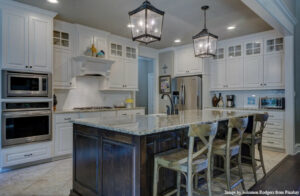 2021 Kitchen Trends: Everything That You Must Know
2021 Kitchen Trends: Everything That You Must Know
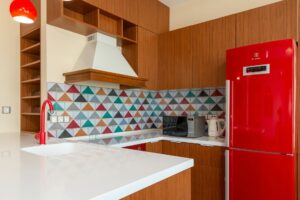 Small Space, Big Style: A Guide to Mobile Home Kitchen Remodel
Small Space, Big Style: A Guide to Mobile Home Kitchen Remodel
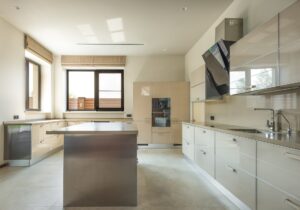 How Tall is a Kitchen Island? And Many More Frequently Asked Questions around Islands Answered by Experts
How Tall is a Kitchen Island? And Many More Frequently Asked Questions around Islands Answered by Experts
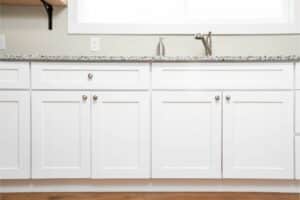 The Timeless Beauty of White Oak Kitchen Cabinets
The Timeless Beauty of White Oak Kitchen Cabinets
 European Kitchen Cabinets: A Comprehensive Guide for Homeowners
European Kitchen Cabinets: A Comprehensive Guide for Homeowners
